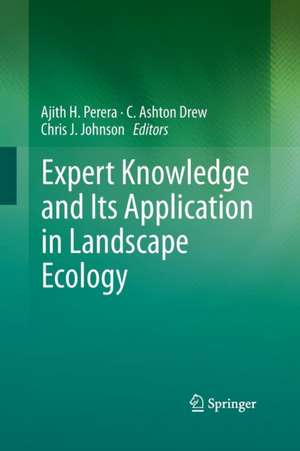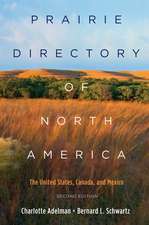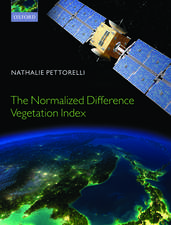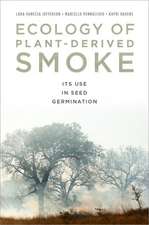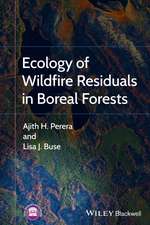Expert Knowledge and Its Application in Landscape Ecology
Editat de Ajith H. Perera, C. Ashton Drew, Chris J. Johnsonen Limba Engleză Paperback – 24 oct 2014
| Toate formatele și edițiile | Preț | Express |
|---|---|---|
| Paperback (1) | 945.79 lei 6-8 săpt. | |
| Springer – 24 oct 2014 | 945.79 lei 6-8 săpt. | |
| Hardback (1) | 950.52 lei 6-8 săpt. | |
| Springer – 21 oct 2011 | 950.52 lei 6-8 săpt. |
Preț: 945.79 lei
Preț vechi: 1153.39 lei
-18% Nou
Puncte Express: 1419
Preț estimativ în valută:
180.97€ • 188.97$ • 149.44£
180.97€ • 188.97$ • 149.44£
Carte tipărită la comandă
Livrare economică 15-29 aprilie
Preluare comenzi: 021 569.72.76
Specificații
ISBN-13: 9781489995490
ISBN-10: 1489995498
Pagini: 324
Ilustrații: XIV, 307 p.
Dimensiuni: 155 x 235 x 17 mm
Greutate: 0.45 kg
Ediția:2012
Editura: Springer
Colecția Springer
Locul publicării:New York, NY, United States
ISBN-10: 1489995498
Pagini: 324
Ilustrații: XIV, 307 p.
Dimensiuni: 155 x 235 x 17 mm
Greutate: 0.45 kg
Ediția:2012
Editura: Springer
Colecția Springer
Locul publicării:New York, NY, United States
Public țintă
GraduateCuprins
Foreword.- Acknowledgements.- List of Contributors.- 1. Experts, expert knowledge, and their roles in landscape ecological applications.- 2. What is expert knowledge, how is such knowledge gathered, and how do we use it to address questions in landscape ecology?.- 3. Elicitator: a user-friendly, interactive tool to support scenario-based elicitation of expert knowledge.- 4. Eliciting expert knowledge of forest succession using an innovative software tool.- 5. Expert knowledge as a foundation for the management of secretive species and their habitat.- 6. Incorporating expert knowledge in decision-support models for avian conservation.- 7. An expert-based modeling approach to inform strategic and operational land management decisions for the recovery of woodland caribou.- 8. Using expert knowledge effectively: lessons from species distribution models for wildlife conservation and management.- 9. Exploring expert knowledge of forest succession: an assessment of uncertainty and a comparison with empirical data.- 10. Assessing knowledge ambiguity in the creation of a model based on expert knowledge and comparison with the results of a landscape succession model in central Labrador.- 11. Use of expert knowledge to develop fuel maps for wildland fire management.- 12. Using Bayesian mixture models that combine expert knowledge and GIS data to define ecoregions.- 13. Eliciting expert knowledge of ecosystem vulnerability to human stressors to support comprehensive ocean management.- 14. Elicitation and use of expert knowledge in landscape ecological applications: a synthesis.- Index
Recenzii
From the reviews:
“The volume is comprised of contributed chapters featuring a nice variety of research questions, ecosystems and approaches, all from a landscape ecology perspective. The quality of the chapters is consistently high, and the explicit focus on the application of expert knowledge (EK) is the unifying thread. … The volume was explicitly aimed at landscape ecologists, although ecologists of all stripes will find this information extremely useful. … I most certainly recommend this book to any ecologist that relies on EK in their work.” (Eric J. Gustafson, Landscape Ecology, Vol. 28, 2013)
“The volume is comprised of contributed chapters featuring a nice variety of research questions, ecosystems and approaches, all from a landscape ecology perspective. The quality of the chapters is consistently high, and the explicit focus on the application of expert knowledge (EK) is the unifying thread. … The volume was explicitly aimed at landscape ecologists, although ecologists of all stripes will find this information extremely useful. … I most certainly recommend this book to any ecologist that relies on EK in their work.” (Eric J. Gustafson, Landscape Ecology, Vol. 28, 2013)
Notă biografică
It is not uncommon for landscape ecologists to rely on advice and input of experienced professionals, albeit informally, in conducting research and devising solutions for applied problems in conservation and management.
Given the wealth of expert knowledge available and the risks of its ad-hoc and implicit application in landscape ecology, it is essential to formalize the use of expert knowledge and establish rigor in methodology.
In this context, Expert Knowledge and Its Application in Landscape Ecology explores several questions: who are experts; what is expert knowledge; and how is it elicited, characterized, and applied. It contains:
· An introduction to the concept of experts and expert knowledge for landscape ecologists
· A series of research studies on methods of expert knowledge capture and applications in conservation biology, wildlife ecology, forest succession, wildland fire, ecoregionalization, and marine ecosystems; from Australia, Canada, and USA
· A synthesis of the state of knowledge on expert knowledge in landscape ecology, with a review of the advantages and disadvantages of incorporating expert knowledge in landscape ecological applications.
The book is written for researchers, graduate students, and practitioners in landscape ecology, focusing on conservation and management of terrestrial and marine resources.
About the Editors:
Ajith H. Perera is Senior Research Scientist in the Forest Landscape Ecology Program at the Ontario Forest Research Institute, Ontario Ministry of Natural Resources.
C. Ashton Drew is Research Associate in the North Carolina Cooperative Fish and Wildlife Research Unit, North Carolina State University.
Chris J. Johnston is Associate Professor in the Ecosystem Science Management Program at the University of Northern British Columbia.
Given the wealth of expert knowledge available and the risks of its ad-hoc and implicit application in landscape ecology, it is essential to formalize the use of expert knowledge and establish rigor in methodology.
In this context, Expert Knowledge and Its Application in Landscape Ecology explores several questions: who are experts; what is expert knowledge; and how is it elicited, characterized, and applied. It contains:
· An introduction to the concept of experts and expert knowledge for landscape ecologists
· A series of research studies on methods of expert knowledge capture and applications in conservation biology, wildlife ecology, forest succession, wildland fire, ecoregionalization, and marine ecosystems; from Australia, Canada, and USA
· A synthesis of the state of knowledge on expert knowledge in landscape ecology, with a review of the advantages and disadvantages of incorporating expert knowledge in landscape ecological applications.
The book is written for researchers, graduate students, and practitioners in landscape ecology, focusing on conservation and management of terrestrial and marine resources.
About the Editors:
Ajith H. Perera is Senior Research Scientist in the Forest Landscape Ecology Program at the Ontario Forest Research Institute, Ontario Ministry of Natural Resources.
C. Ashton Drew is Research Associate in the North Carolina Cooperative Fish and Wildlife Research Unit, North Carolina State University.
Chris J. Johnston is Associate Professor in the Ecosystem Science Management Program at the University of Northern British Columbia.
Caracteristici
Incorporates the collective experience and knowledge of over 35 researchers in landscape ecology representing a diverse range of disciplinary subject areas and geographic locations Introduces the concept of expert knowledge and examine its role in landscape ecological applications Case studies address a range of topics that will interest landscape ecologists and other resource management and conservation professionals Includes supplementary material: sn.pub/extras
